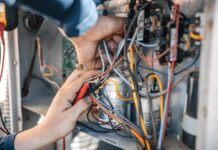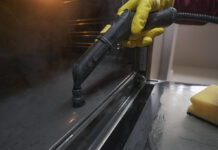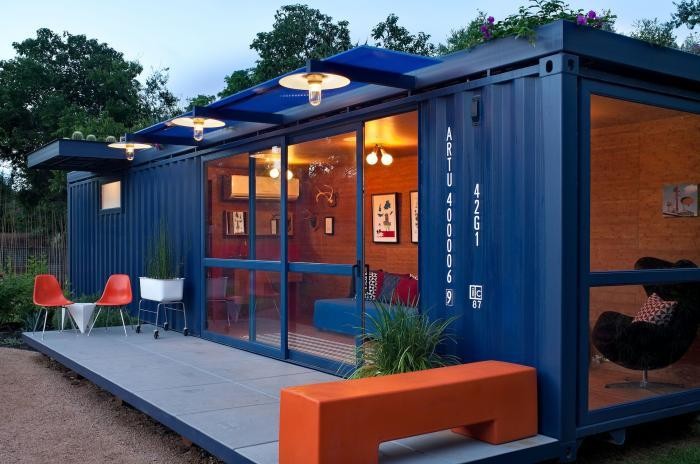Pressure washers may be one of the most versatile garden power tools, helping you quickly complete almost any outdoor cleaning task. There is no cleaning job you can’t handle when you have a good power washer at your hand, from cleaning home’s exterior and sidewalks to patios and garden furniture.
What Is a Pressure Washer?
Pressure washers, also known as power washers or jet washers, use a pressurized water jet to clean various surfaces around your property. What’s interesting is that pressure washers use a lot less water than your standard garden hose, so they are a great way to prevent water waste.
And as such a great tool, they come in all shapes and sizes, and with a difference in power and features. When you decide to buy one, it can be really hard to know which one will be good for you. So before we show you how to choose a suitable pressure washer, you should learn a thing or two about their specifications.
Power Washer Measurements
There are actually three different ways to measure the power of a jet washer:
- The power of the pressure pushing the water out is measured in Bar
- The rate of water flow is measured in liters per hour
- The mechanical power of the pressure washer is measured in either watt (W) for electric or Horsepower (Hp) for petrol power washers.
Out of those three, water pressure and water flow are most important because they determine how powerful your new pressure washer will be.
Step 1: Power Washer Pressure and Flow Rate
When it comes to pressure and flow of the power washers, they can be put in three different categories:
- Light Duty/Up to 100 bar- good for cleaning cars, decking, fences, and garden furniture.
- Medium duty/110-130 bar- can clean your patio, car, driveway, decking, and fences, but NOT your garden furniture.
- Heavy-duty/130 bar and over-will do a great job cleaning your patio, cars, driveways, and decking, but should NOT be used for fences and garden furniture.
As you can see, it all depends on the type of surface you’ll be cleaning, how dirty the surface is going to get, and how often you’ll clean it. The flow rate will reflect in the rinsing performance of your power washer. A higher flow rate will mean a lot with tasks like car cleaning.
Suppose you feel like you can’t choose the right pressure washer or are not skilled enough to handle one. In that case, you can always hire a professional cleaning company and avoid injuring yourself or damaging your property.
According to Pressure Washing America, that’s been offering affordable pressure washing services in Huston, TX for a decade, the best way to clean your home’s exterior, patio, or driveway is to hire a professional who knows power washing and soft washing.
Step 2: Electric or Petrol Power Washer?
Electric Pressure Washer
Most pressure washers are, in fact, electric-powered because they are simply more suitable to work with around your home. Electric power washers need to be plugged in the outdoor power socket with RCD (residual current device), and their range can be extended with an outdoor extension lead ( the one that has protection from water splashes).
Petrol Pressure Washer
Unlike electric power washers, petrol-powered pressure washers don’t need to be plugged in. This feature is really convenient when you have a large property with parts that are simply too far away from any power socket. They are also suitable for tougher cleaning jobs around your property. However, you’d need to invest in a fuel container if you want to have enough fuel for the whole property.
Step 3: Pressure Washer Motor Type
The motor type is not the most important feature in pressure washers, but it’s always good to know what you’re buying.
- Brush Motor- brushes are in constant contact with the rotating part of the motor, which leads to friction and causes wear and tear over time.
- Universal motor- high-speed and compact motor that is very loud and has a shorter life span
- Induction Motor- high-tech and complex motor working quietly and longer than other types
Step 4: Power Washer Features
Some features of your pressure washer can be pretty important and valuable, so pay attention to them:
Lances
Lances provide additional control over water flow. They are attached to the trigger gun and can regulate the water pressure without having any impact on water usage.
Hose Length
The length of the hose connecting the main unit to the trigger gun is vital. Look for the length that will allow you to complete all the cleaning tasks you had in mind quickly.
Wheels and Handles
If you plan to clean your entire property in one go, having a pressure washer you can wheel around as you clean can be a great advantage.
Auto Stop/Start
The pressure washers with an Auto start/stop button can considerably reduce water waste. Instead of switching the machine on/off on the main machine, you can do the same thing on the spray gun.
Step 5: Pressure Washer Accessories
Your power washer can come with many accessories that make the cleaning job really fun. Do you want to add detergent to your pressure washing? Just find a good detergent system. Need a brush? You can always attach one that fits your pressure washer.
Wash Brushes– pressure washer brushes can be used to clean cars and bikes, especially wheel arches and hub caps.
Patio Cleaners– with patio cleaners, you can direct the water flow for patio deep cleaning, while reducing the amount of mess you make at the same time.
Integrated Storage– pressure washers can be bulky, but you won’t have troubles putting them away if they have an integrated storage for spray guns and lances.
Detergents and Detergent Systems– some power washers have detergent tanks that you can fill with a cleaner, and some have interchangeable detergent bottles that allow you to change cleaners as you work. Either way, they are a great addition to any outdoor cleaning job.
As for the detergents, your best bet se universal detergents that can clean almost any type of dirt on any surface. And in case you want to clean a tricky stain on a highly-porous surface, there are cleaners for that too.

















